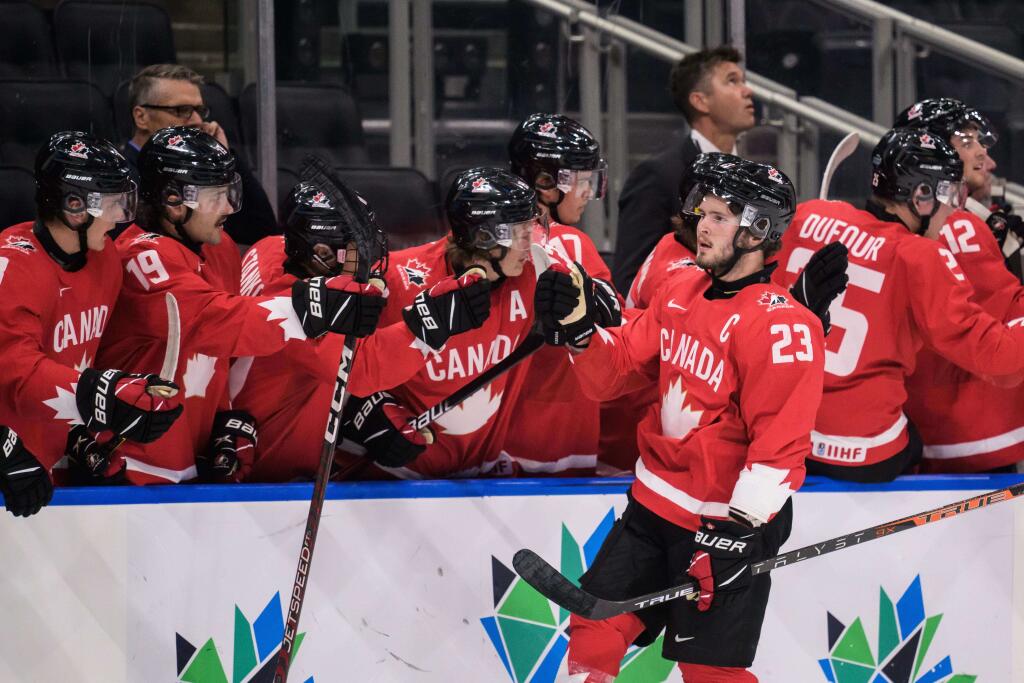2022 World Juniors Notebook: Matthew Coronato’s off-puck play, Joakim Kemell’s playmaking and more
While the competition hasn’t been stiff, the Unites States' success through the preliminary round has largely been a team effort. From top-to-bottom, it’s tough to think of a player that hasn’t made an impact in at least one of their four consecutive victories.
Among the team’s most consistent players has been Matt Coronato, the Calgary Flames first-rounder with goals in three straight games.
Coronato isn’t the fastest, flashiest, or most skilled player on the USA squad, but he might be its best at getting open.
Where most players sprint to the net, Coronato slows down, skates closer to the puck carrier, and establishes body positioning on the defender, encouraging a play-building pass over a low-percentage shot. If short support isn’t an option, Coronato slides down the weak side, presenting his stick while keeping his back to defenders. Around the net, he positions himself between defenders, constantly twisting and turning his body face the puck carrier.
Many prospects show those skills, but few link them together like Coronato. Take the shift leading up to his goal against Switzerland, for example. In 14 seconds, he intercepted a pass, gained the zone, and became a passing option and shooting threat four times different times. Each time, he either slipped behind the back of the defender or established positioning, turned to face the play to follow the puck, and always presented his stick, ready to shoot off the pass.
All three of Coronato’s scoring chances against Sweden (including his goal) showcased similar off-puck ability. And his off-puck movement influences other areas, too. For one, he creates passing lanes for his teammates by engaging defenders around the slot. When the puck arrives on his stick, he often immediately makes the next pass, then accelerates into space for the return feed.
Coronato’s gradual shift from a straight-line puck-rushing winger to a deceptive, multi-faceted creator with an advanced off-puck over the past three years significantly bolsters his odds of becoming a top-six forward.
Joakim Kemell, RW, Finland (Nashville Predators)
The NHL shooting game is much more than power, accuracy, and volume. It’s about timing and awareness — anticipating windows of opportunity and exploiting them at the perfect moment. There’s also a threshold of playmaking skill that most 30-goal-scorers must reach. The vision and skill to initiate and complete give-and-goes help players beat defenders without relying on inefficient 1-on-1 plays, while the threat of a dangerous pass keeps the opposition honest.
Kemell didn’t reach that threshold last season, defaulting to low-percentage shots with better-positioned teammates and failing to build plays. Through the preliminary round of this tournament, Kemell has flipped, almost becoming too eager to pass in some situations.
Where Kemell previously forced a low-percentage shot, he now stops and waits for support. Subtle transition plays, like short-range touch passes, have allowed him to bypass defenders without the need for dekeing through them. Instead of shooting when he runs out of space, he’s cutting back and finding the trailer, sometimes in spectacular fashion. On the powerplay, Kemell has started layering deception on his plays, like turning his body and eyes to the point, drawing a penalty killer away from his preferred cross-slot lane.
Those changes haven’t just made Kemell a better shot-creator for his teammates; he’s building plays, creating better looks for himself in the process. If he builds off this increased willingness to pass, there’s a real chance that he will exceed not only the No. 17 overall spot where the Predators picked him but also the No. 10-rank where Elite Prospects ranked him for his draft class.
Brock Faber, D, USA (Minnesota Wild)
Points and Faber aren’t friends. OK, maybe that’s a bit harsh, but with a point per game hovering between 0.44 and 0.48 in the last seasons, it’s clear he’s not much of a point-getter. But watching Faber, whether at this World Juniors or with the Minnesota Golden Gophers, it’s easy to wonder how he doesn’t score more. After all, he’s so prolific defensively, especially in the neutral zone, that most of his shifts are spent in the neutral and offensive zones.
One major change from Faber’s NTDP time has been activation. Previously quite passive, he now joins the play as much as possible. He’s particularly prolific at using the weak side, sprinting up the far-side boards, either slipping away from the defence or diverting attention away from his teammates and toward himself.
The next step in Faber’s development is to go from being a facilitator to a creator. He will need to learn to use his mobility, skill and vision after activating up the weak side. Currently, he’s too focused on funnelling pucks to the net, whether with a shot or a pass to the middle lane driver. While it often leads to offensive zone faceoffs or a low-percentage shot, he misses high-danger options, usually the forward trailing the rush.
With increasingly willingness to delay once receiving the puck and improved puck skills, Faber could finally become the activating creator he tries to be.
Dalibor Dvorsky, C, Slovakia (2023 NHL Draft eligible)
It’s tough to shine at the World Juniors as a first-time draft-eligible player, even for high-end prospects like Dalibor Dvorsky. The additional pace and details of opponents make it forgivable when 17-year-old talents don’t quite match the pace of their 19-year-old counterparts (and 20-year-olds in the case of this tournament).
While Dvorsky hasn’t been the dynamic scorer he’s been elsewhere, he’s still impressed by escaping with possession along the boards and completing plays under pressure. Whether he’s competing for positioning in the slot or retrieving pucks along the boards, he always looks to establish body positioning by putting his body between his stick and the defender. From there, he cuts inside or cuts back to sneak out the back door. And as he continues inside, he uses his stick to fight off the defenders rather than handling the puck, which creates additional time and space.
The flashy handling skill and deceptive playmaking haven’t shined quite as much this tournament, but his physical skills should continue making an impact against much older and experienced opposition.
Ralfs Bergmanis, D, Latvia (2020 Undrafted)
Instead of getting beat up as everyone expected, a well-organized Latvian squad gave Canada a scare for over 30 minutes, lost a coinflip in the shootout against Slovakia, and then booked their ticket to the quarterfinals with a stunning 5-2 victory over Czechia.
In the upset, the well-travelled Bergmanis tallied a hat trick, including the game-winner, the pull-away goal, and the empty-netter to seal it. The second was a particular well-executed play, a fake shot reception into lateral movement, a play that should be in every blueliner’s playbook.
Ralfs Bergmanis Hat Trick Watch ? and Latvia leads 4-2! #WorldJuniors
— Elite Prospects (@eliteprospects) August 14, 2022
?: https://t.co/IOqjculoippic.twitter.com/meqogVpCJy
Bergmanis’ sequence isn’t just a scripted play, he’s actively reading the situation. He fakes the shot on the penalty killer moving towards him; the fake locks their feet in the opposite direction he wants to go. As he walks closer to the net, he sees the goaltender peeking around the right of the screen, creating space on the left – that’s where he shoots. Throughout the sequence, his head is up and his feet are moving.
Bergmanis slotted into Sioux City’s No. 4/5 role with occasional powerplay time and regular penalty kill shifts last season. He should play a similar role with the University of Vermont, which has very quietly built up one of the NCAA’s more interesting teams with six NHL draft picks.



